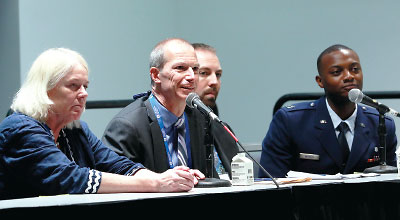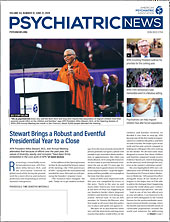Traumatic brain injury (TBI) and posttraumatic stress disorder (PTSD) often overlap, both in their traumatic cause and in their symptoms; thus, differentiating between the two can be critical for treatment and determination of disability.
People with either condition may exhibit sleep problems, depression, flashbacks, avoidance, light or noise sensitivity, or irritability.
Several physiological mechanisms come into play to produce those outcomes, said U.S. Air Force Capt. Brandon Withers, administrative chief resident in the Department of Psychiatry at Wright State University in Dayton, Ohio, during a session at APA’s 2019 Annual Meeting in San Francisco. The immune system is activated in the face of tissue damage and imminent threat, as are neuroendocrine and catecholaminergic mechanisms, he said.
“It’s difficult to tease out which of these systems you’re dealing with based only on symptoms and a history of trauma,” said Withers. “Rating scales designed to measure PTSD versus postconcussion syndrome symptoms should not be presumed specific in the setting of potential comorbidity.”
Application for disability status in the armed forces is diametrically opposite from the civilian world, said Jeffrey Guina, M.D., a former Air Force psychiatrist now at the Center for Forensic Psychiatry in Saline, Mich. In the U.S. military, the claimant gets the benefit of the doubt. Among civilians, the burden of proof is on the claimant.
As a private disability consultant for the insurance company Lincoln Financial Group, Keith Caruso, M.D., of Brentwood, Tenn., is often called on to evaluate claims of disability by individuals with PTSD or TBI.
“Neuropsychological findings found in both PTSD and TBI include deficits in attention, verbal memory, and response inhibition, although cognitive deficits in PTSD are typically less severe than in TBI,” said Caruso. Neuropsychological testing can reveal findings specific to TBI, such as changes in IQ or memory problems, processing speed, and executive function. Headaches, dizziness, tinnitus, and disequilibrium are also common. Comparing those symptoms with those of PTSD, even when there is some overlap, can help differentiate the two conditions and guide appropriate treatment.
In military populations, the overlap is unsurprising, given the frequency of roadside bomb attacks during the recent conflicts in Iraq and Afghanistan, said former U.S. Army psychiatrist Elspeth Cameron Ritchie, M.D., M.P.H.
“PTSD always has comorbidities,” said Ritchie. Soldiers who survive a bomb attack may have both concussive symptoms but also other physical wounds ranging from genital injuries to facial burns. They may already be sleep deprived and may develop depression or alcohol abuse.
There are three types of treatment, said Ritchie: “Medications, psychotherapy, and everything else.”
Only sertraline and paroxetine have been approved for use with PTSD but sometimes other medications are used, too. Ritchie has found success with bupropion because it does not induce weight gain and can reverse the sexual side effects of selective serotonin reuptake inhibitors, she said. Low doses of a second-generation antipsychotic like quetiapine may help with trauma-induced nightmares, although their use is controversial. Prazosin has also been used to reduce nightmares.
Patients seen at the Veterans Health Administration seeking psychotherapy most commonly receive cognitive-behavioral therapy and cognitive processing therapy. Patients tend to benefit most from these therapies when informed in advance of treatment that it involves extended discussion of the traumatic episode.
Patients with PTSD and TBI also may benefit from acupuncture, exercise, virtual reality technology, yoga, or working with dogs or horses—all based on the idea that the patients have some control over their therapy, Ritchie said. ■

